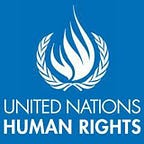In search for missing migrants, relatives never lose hope
For nearly 10 years, Maria Elena Larios of El Salvador has looked for her son Heriberto, who went missing while trying to make it to Mexico to search for a better life.
In 2010, Maria Elena Larios’ son, Heriberto Antonio Gonzalez left home in El Salvador looking for a better life in Mexico. He was never again seen by his family.
Nearly a decade later, Larios still searches for him, refusing to give up the hope that he is still alive. Even her references to Heriberto are in the present tense.
“For me it has been very difficult to have this empty space at home,” she said. “I am always searching and waiting for him. For me he is alive. I continue talking about him in the present tense. . . and I will continue searching for him until I can find an answer about him.”
The precarious situation facing migrants who take long and often perilous journeys to find a better life, has been the recent focus of United Nations experts who look into enforced or involuntary disappearances. In its latest report, the Working Group on Enforced or Involuntary Disappearances stated that there is a direct link between migration and enforced disappearances. This is “either because individuals leave their country as a consequence of a threat or risk of being subjected to enforced disappearances there or because they disappear during their journey or in the country of destination.”
For Larios, it is unclear where along the journey to Mexico her son disappeared. Heriberto went missing in 2010, and the family reported it to the authorities in El Salvador that same year. Larios continued to make inquiries to the Ministry of Foreign Affairs in El Salvador, as well as reaching out to other organizations to help get word of her son.
“We looked for him in prisons, hospitals, and waste disposal sites; we posted leaflets and posters on the streets; we went to the Ombudsperson Office in El Salvador, with the Prosecutor. I kept waiting but nothing happened,” she said.
Then Larios joined the Caravana de Madres de Migrantes Desaparecidos (Caravan of mothers of missing migrants), a group that travels the migration route through Mexico, searching for information on missing loved ones. Since 2005, the group has organized trips for families of missing migrants from Central America stopping in cities along the migration route in Mexico to look for information.
Each year from 2016 through 2018, Larios went with the caravan, hoping for information. She had some luck.
“(In 2016) one couple recognised the photo of my son. They told me they have seen him and that he was injured, and explained to me that they helped him. I could not believe them at the beginning, so I asked them many times, and they confirmed having seen my son,” she said. “I have received other indications in 2017 and 2018 that my son is alive.”
Attention to the claims of the relatives is a key factor in advancing mechanisms to achieve investigation, prosecution and punishment of perpetrators, the Working Group report stated. The remoteness and lack of contact with the authorities of the country where the person has disappeared, among many reasons, make it difficult for the family to participate in the investigation, a circumstance that affects not only their rights but also the efficacy of the search, the report states.
The Guiding Principles for the Search of Disappeared Persons, which was adopted by the Committee on Enforced Disappearances this year, emphasizes the importance of States to establish effective cooperation agreements in the search for the disappeared in the context of migration. This includes permitting the rapid and secure exchange of information and documentation that may help to locate the missing migrant.
Larios agreed that it is important for families of the missing to get cooperation from States.
“We also have the support of the Mechanism for the Support of Migrants, of Mexico,” she said. “The Mechanism is supporting us; they are coming here from time to time to inform us about the search of our relatives.”
And things are moving along in the search, just not as fast as Larios would like.
“There is some progress made, step by step. I am always telling them: continue searching for him!”
Watch an interview with Maria Elena Larios on the efforts to locate her missing son.
